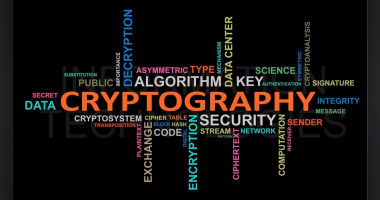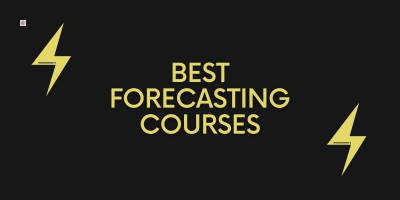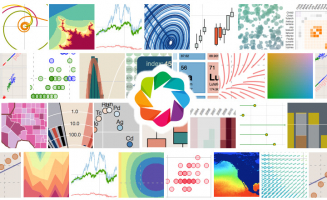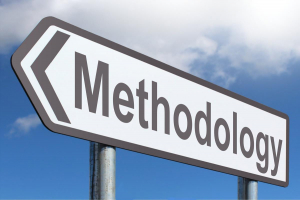Top 10 Best Online Statistics Courses
In previous decades, a profession in statistics was predominantly connected with university teaching. Data, on the other hand, has become a critical component ... read more...for successful operations thanks to various multidisciplinary breakthroughs. The US Bureau of Labor Statistics has identified statisticians as a job trend that will expand faster than most occupations, with an estimated growth rate of 33%. As a result of the increased chances, now is an excellent time for hopefuls to upskill and dig deep into a successful career in some of the most popular fields. Here are top 10 best online statistics courses.
-
On the Udemy platform, this is one of the most popular online statistics courses. The course covers 163 sessions, including demonstrations, text explanations, quizzes, and assignments, and helps learners to gain a full understanding of ideas ranging from the fundamentals to the most sophisticated.
When you think you’ve got a good grasp on a topic within a course, you can test your knowledge by taking one of the quizzes. If you pass, great! If not, you can review the videos and notes again or ask for help in the Q&A section. When you've finished the section, you can review everything you've learned by working through the bonus workbook. The workbooks include tons of extra practice problems, so they're a great way to solidify what you just learned in that section.
The key takeaways from the course include:
- Data visualization using bar graphs, pie charts, histograms, and plots.
- Analyzing data using mean, median, mode, and IQR.
- Data distributions and probability including mean, variance, and standard deviation.
- Bayes theorem, union and intersections, and independent and dependent events.
- Discrete random variables, Poisson, and geometric random variables.
- Sampling and types of studies, bias, confidence intervals.
- Hypothesis testing, statistical inference analysis, significance levels, and test statistics.
- P-values, regression, scatter plots and correlation coefficients, and chi-square.
What you will learn
- Visualizing data, including bar graphs, pie charts, venn diagrams, histograms, and dot plots
- Analyzing data, including mean, median, and mode, plus range and IQR and box-and-whisker plots
- Data distributions, including mean, variance, and standard deviation, and normal distributions and z-scores
- Probability, including union vs. intersection and independent and dependent events and Bayes' theorem
- Discrete random variables, including binomial, Bernoulli, Poisson, and geometric random variables
- Sampling, including types of studies, bias, and sampling distribution of the sample mean or sample proportion, and confidence intervals
- Hypothesis testing, including inferential statistics, significance level, type I and II errors, test statistics, and p-values
- Regression, including scatterplots, correlation coefficient, the residual, coefficient of determination, RMSE, and chi-square
The course curriculum includes:
- Getting started
- Visualizing data
- Analyzing data
- Probability
- Discrete random variables
- Sampling
- Hypothesis testing and regression
- Final exam and wrap-up
Instructor: Krista King
Level: Beginner
Duration: 14 hours and 21 minutes
User Review: 4.7/5
No. of Reviews: 7747
Price: $47.8
Enroll here: udemy.com/course/statistics-probability/
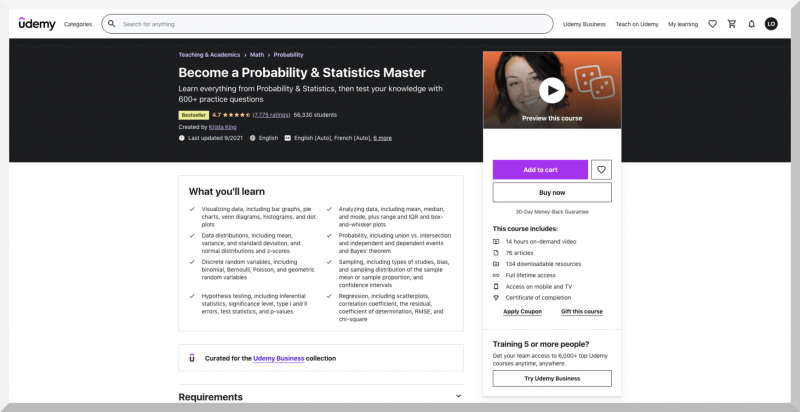
learnacourseonline.com -
Introduction to Statistics by Stanford University ranks 2nd in the list of the best online statistics courses. This course is offered through Coursera. This course focuses on developing excellent core statistical skills so that learners may effectively interact with data and express insights. Descriptive statistics, sampling and randomized controlled experiments, probability, sampling distributions, and the central limit theorem are all covered in this course.
In addition, some critical elements such as regression, a common test of significance, and resampling are thoroughly discussed. Learners will be able to perform data analysis, distinguish between descriptive and prescriptive statistical concepts, deal with data sets, and select appropriate tests for a variety of situations by the end of the course. Learners who want to study advanced statistical analysis and machine learning courses will find the principles presented in this course sufficient.The curriculum includes:
- Introduction and descriptive statistics for exploring data
- Producing data and sampling
- Probability
- Normal approximation and binomial distribution
- Sampling distributions and central limit theorem
- Regression, confidence intervals, and tests of significance
- Resampling and analysis of categorical data
- One-way analysis of variance (ANOVA) and multiple comparisons
Instructor: Guenther Walther
Level: Beginner
Duration: 15 hours
User Review: 4.6/5
No. of Reviews: 405
Price: Free Enrollment (Additional charges for certification may apply)
Enroll here: coursera.org/learn/stanford-statistics
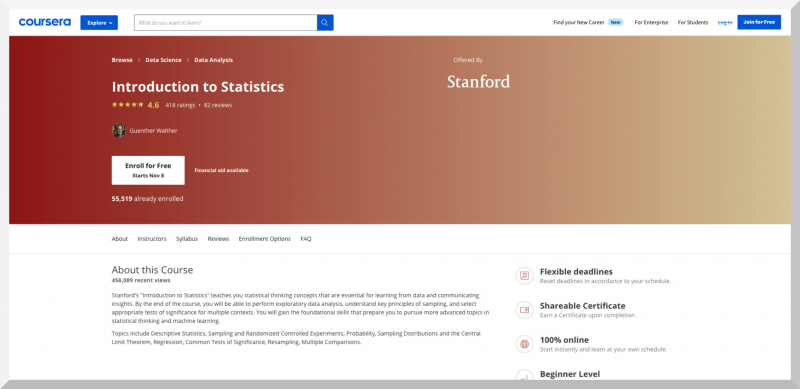
learnacourseonline.com -
Statistics for Data Science and Business Analysis ranks 3rd in the list of best online statistics courses. This online course is available through Udemy. This course will teach students how to identify and analyze complex statistical problems in an organizational setting. The program includes simple ideas, several practical exercises, extra materials, and an introduction to all relevant statistical jargon. In addition, the students will learn about data visualization and statistical ideas that a data scientist or data analyst needs to generate insights from enormous amounts of data.
Learners will be well-prepared to understand statistical basics, visualizing diverse data types, correlation and covariance, confidence intervals, and making data-driven decisions by the end of the course. Furthermore, the students will obtain a basic understanding of how to use a programming language such as Python or R to do hypothesis testing, regression analysis, and other statistical measures on various sorts of data distributions and variables. Furthermore, the students will obtain a basic understanding of how to use a programming language such as Python or R to do hypothesis testing, regression analysis, and other statistical measures on various sorts of data distributions and variables.
The course contents are:
- Introduction
- Sample or population data
- The fundamentals of descriptive statistics
- Measures of central tendency, asymmetry, and variability
- Practical examples
- Distributions
- Estimators and estimates
- Hypothesis testing and fundamentals of regression analysis
- Assumptions for linear regression analysis
Instructor: 365 Careers Team
Level: Beginner
Duration: 4 hours 51 minutes
User Review: 4.6/5
No. of Reviews: 26,029
Price: $47.8Enroll here: udemy.com/course/statistics-for-data-science-and-business-analysis/
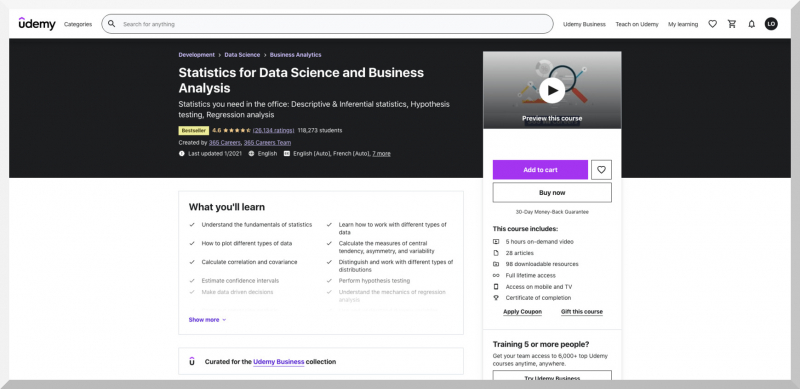
learnacourseonline.com -
Probability and Statistics for Business and Data Science ranks 5th in the list of best online statistics courses. On Udemy, you can take this certification course. From a business and data science standpoint, the training curriculum covers probability and statistics principles. Theoretical aspects and applications of statistics in real-world problems will be covered by the students.
In addition, the students will learn about the fundamentals of data and how to analyze data using various statistical measurements such as central tendency and dispersion, as well as how bivariate data sources are related to one another. The students will also study probability, combinations and permutations, conditional probability, and the Bayes theorem. Furthermore, the fundamentals of distributions are well explored. Finally, advanced topics such as ANOVA, regression analysis, and chi-square analysis will be covered.The course contents are:
- Measurements of Data
- Mean, Median, and Mode
- Variance and Standard Deviation
- Covariance and Correlation
- Permutations and Combinations
- Unions and Intersections
- Conditional Probability
- Bayes Theorem
- Binomial Distribution
- Poisson Distribution
- Normal Distribution
- Sampling
- Central Limit Theorem
- Hypothesis Testing
- T-Distribution Testing
- Regression Analysis
- ANOVA
- Chi-Squared
Instructor: Jose Portilla
Level: Beginner/Intermediate
Duration: 5 hours and 14 minutes
User Review: 4.6/5
No. of Reviews: 4531
Price: $47.8
Enroll here: udemy.com/course/probability-and-statistics-for-business-and-data-science/
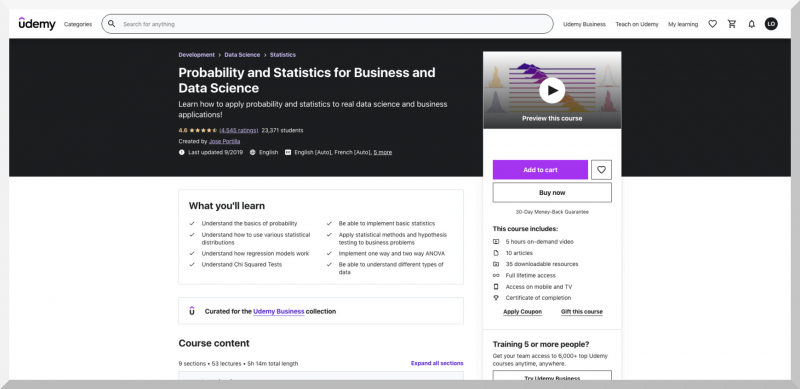
learnacourseonline.com -
This is one of Coursera's most popular online statistics courses. The course covers key data analysis and visualization topics in R, as well as how to produce repeatable analytical reports. In addition, the students will learn how to make data-driven decisions using statistical inference, Bayesian statistical inference, and modeling. Furthermore, the students will learn how to effectively explain statistical results and analyze data-driven decisions, as well as data wrangling with R programs for data analysis.
In this Specialization, you will learn to analyze and visualize data in R and create reproducible data analysis reports, demonstrate a conceptual understanding of the unified nature of statistical inference, perform frequentist and Bayesian statistical inference and modeling to understand natural phenomena and make data-based decisions, communicate statistical results correctly, effectively, and in context without relying on statistical jargon, critique data-based claims and evaluated data-based decisions, and wrangle and visualize data with R packages for data analysis.
The course modules are:
- Introduction to probability and data with R
- Inferential statistics
- Linear regression and modeling
- Bayesian
- Statistics with R Capstone
Skills you will achieve:
- Statistics
- R Programming
- Rstudio
- Exploratory Data Analysis
- Statistical Inference
- Statistical Hypothesis Testing
- Linear Regression
- Regression Analysis
What you get from the course:
- Shareable Certificate: Get a Certificate when you complete
- 100% online course: Start now and learn at times that suit you: Flexible scheduling
- Set and meet flexible deadlines: Beginner Level
- No knowledge required: Approximately 5 months to complete
- Recommended pace of 2 hours/week: English
- Subtitles: English, Arabic, French, Portuguese (European), Italian, Vietnamese, Korean, German, Russian, Spanish
Instructor: Mine Cetinkaya- Rundel
Level: Beginner
Duration: 7 months
User Review: 4.6/5
No. of Reviews: 5132
Price: Free Enrollment (Additional charges for certification may apply)
Enroll here: coursera.org/specializations/statistics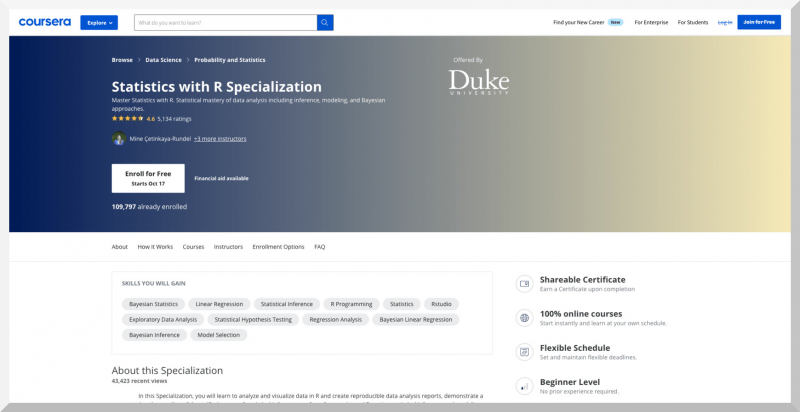
coursera.org 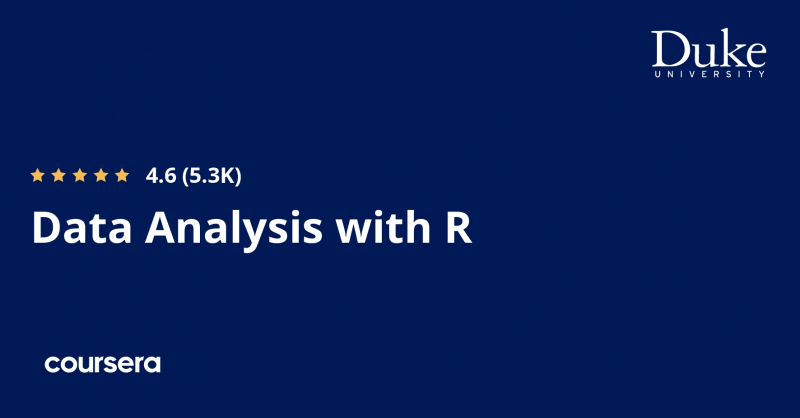
coursera.org -
Statistics with Python Specialization by University of Michigan ranks 7th in the list of best online statistics courses. This course is offered through Coursera. The specialization teaches learners how to use the Python programming language to master various statistical concepts. Learners will comprehend data sources, types of data, and the data collection, analysis, and management process. Furthermore, the students will be familiar with data exploration and visualization approaches.
Furthermore, the students will delve into data assessment theories, build confidence interval concepts, and interpret inferential outcomes. Furthermore, sophisticated statistical modeling processes are thoroughly explored, with actual hands-on workshops to help students learn the abilities. Finally, the students will be able to connect research issues to statistical and data analytic methodologies in order to solve complicated problems in a real-world setting.
The course modules are:
- Understanding and visualizing data with Python
- This module introduces the field of statistics, data sources, study design, and data management aspects of a data science problem.
- In addition, the learners will explore the data and communicate the findings with data visualization techniques. The learners will have a solid understanding of various data types and interpret univariate and multivariate data summaries.
- The module also covers important concepts on probability and non-probability sampling of large populations and learns how each sample varies and how inference can be applied based on probability sampling.
- Finally, the learners will apply the statistical concepts using Python during lab sessions and implement various libraries to perform data analysis.
Inferential statistical analysis with Python
- The second module focuses on the basic principles behind data for estimation and assessment. First, the learners will analyze categorical and quantitative data, population techniques, and expand to handle two populations. Next, the learners will understand how to use confidence intervals and work with sample data to assess whether specific parameters are consistent within the data set.
- Finally, the learners will learn about interpreting inferential results and work on numerous case studies to solidify their skills by implementing statistical concepts using Python.
Fitting statistical models to data with Python
- The course’s final module explores the advanced concepts on statistical inference techniques and learns to fit statistical models to data correctly. In addition, the learners will work on various models and understand the relationship between variables for predictions.
- This module also introduces and explores several statistical modeling techniques such as linear regression, logistic regression, generalized linear models, Bayesian techniques, and hierarchical and mixed-effects models. All of the concepts covered in the module are demonstrated with the help of practical examples using real data sets. Besides, the learners will understand the types of modeling approaches available for different data types based on the underlying study design.
- Finally, the learners will explore data visualization using Python and various libraries such as Statsmodels, Pandas, and Seaborn for advanced statistical analysis.
Instructor: Brenda Gunderson, Kerby Shedden, and Brady T. West
Level: Beginner
Duration: 3 months
User Review: 4.6/5
No. of Reviews: 2220
Price: Free Enrollment (Additional charges for certification may apply)
Enroll here: coursera.org/specializations/statistics-with-python
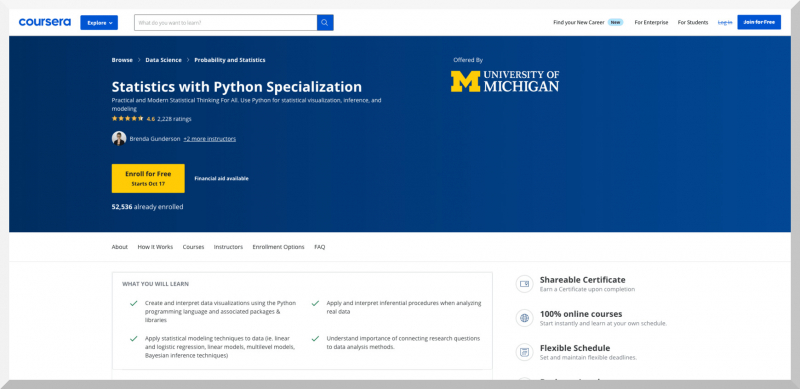
learnacourseonline.com -
Statistics and Machine Learning Specialization by Johns Hopkins University ranks 8th in the list of best online statistics courses. This online course is available through Coursera. The course is designed for students who have a basic understanding of statistics and machine learning. It covers statistical inference, regression models, and data analysis machine learning methods. Learners will also be able to create data products utilizing a variety of tools and approaches, as well as interact with real-world data. Furthermore, the students will have a full understanding of how to develop and implement prediction functions, as well as how to use advanced statistics to draw conclusions about populations and scientific insights from data.
The course contents are:
Statistical inference
- In this module, the learners will understand how to draw conclusions about populations and perform various inferences, including statistical modeling and data-related strategies. Moreover, the learners will understand the uses of designs and randomization in data analysis and the broad theories of frequentists, Bayesian, and Likelihood. In addition, the learners will explore various complexities faced with missing data, observed and unobserved confounding, and bias while handling data.
Regression models
- The second module explores the linear models for assumptions, regression models, and a subset of linear models. Furthermore, the learners will explore the statistical analysis tools for modern data scientists and cover many concepts, including regression analysis, least-square, and inference using statistical models.
- Besides, the learners will delve into advanced concepts and learn to use ANOVA test and analysis of residuals and variability and building scatterplots for presenting analytical reports.
Practical machine learning
- This module covers the essential components of building a prediction function on practical applications. The learners will explore the concepts of training and test data sets, overfitting, and error rates associated with computational models. In addition, the basics of the range of a model and essential machine learning algorithms such as regression. Classification trees, Naïve Bayes, and random forests are covered in-depth with hands-on lab sessions.
Data science capstone
- The final module is mandatory for learners as the capstone requires creating usable and public data products from real-world problems in collaboration with industry, government, or academic partners. The learners are required to clear the capstone to attain the certificate of completion.
Instructor: Brian Caffo, Jeff Leek, and Roger D. Peng
Level: Intermediate
Duration: 6 months
User Review: 4.6/5
No. of Reviews: 484
Price: Free Enrollment (Additional charges for certification may apply)
Website: coursera.org/specializations/data-science-statistics-machine-learning
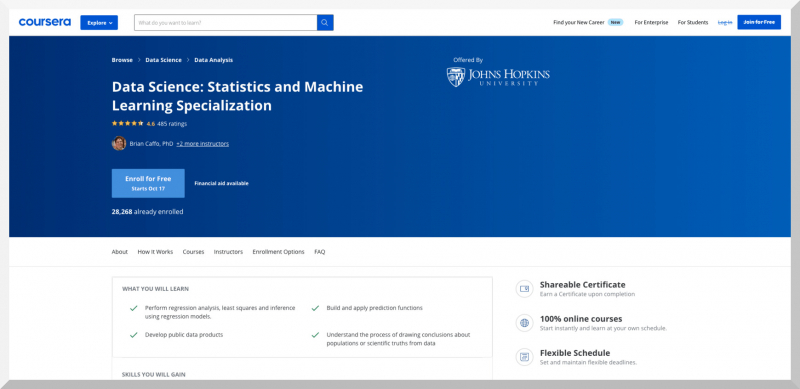
learnacourseonline.com -
This is a Coursera-based specialized course. The early modules of the certification program include essential ideas in probability and statistics. A mathematical statistics bootcamp is also available, which covers the principles and methodologies utilized in biostatistics. In addition, the students will learn about advanced linear modeling principles, data science modeling tools, least-square and linear regression, hypothesis testing, likelihood concepts, and distribution. The students will then dive into the practical implementations of the models in order to execute multivariate regression using the R programming language. In addition, the course provides a solid foundation in linear algebraic needs for data science and the mathematical perspective of linear statistical models.
The curriculum includes:
- Mathematical biostatistics boot camp 1 and 2
- Advanced linear models for data science
- Least-squares
- Statistical linear models
Instructor: Brian Caffo
Level: Advanced
Duration: 5 months
User Review: 4.3/5
No. of Reviews: 165
Price: Free Enrollment (Additional charges for certification may apply)
Website: coursera.org/specializations/advanced-statistics-data-science
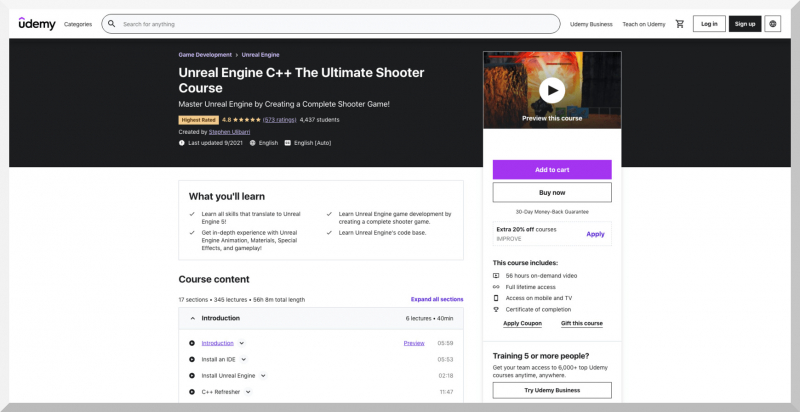
learnacourseonline.com 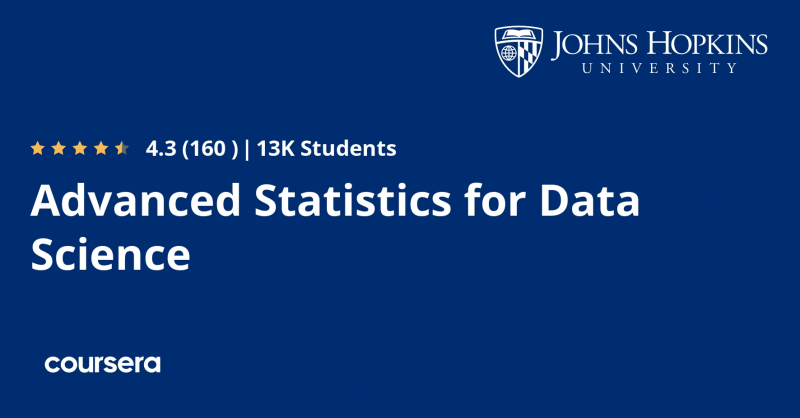
coursera.org -
On the Futurelearn platform, the certification program is available. Learners will begin with statistics and then progress to data analysis using Excel in this class. Furthermore, some of the most important tools and approaches for performing data analysis utilizing Excel formulas to achieve various goals such as importing, cleaning, analyzing, and data manipulation are discussed. Furthermore, using machine learning, the students will delve into the fundamentals of statistics and grasp the basic statistical principles.
Additional mathematical ideas are also covered in order to help students develop excellent statistical skills for data analysis. Learners will have excellent foundations in data analytics and statistics, tools and methodologies, data processing tools for business choices, and advanced Excel procedures to execute statistical analysis from a large database after completing the course.
What topics will you cover:
- Introduction to data analytics
- Processes and tools for data-driven decision-making
- Introduction to fundamental statistics
- Application of fundamental statistical techniques
Prove you're job ready:
- Highlight the new, job-relevant skills you’ve gained and supplement existing qualifications with a hard-earned, industry-specific digital certificate – plus one for every course within your ExpertTrack.
- Learn the latest in your chosen industry or subject.
- Complete each course and pass assessments.
- Receive certificates validated by the educating organisation.
- Impress employers with learning outcomes you can add to your CV.
- Make your career dreams a reality.
What you will achieve
- Identify the benefits of data analysis
- Articulate data analytics fundamentals including basics of statistics
- Identify the correct Excel formula syntax to achieve an objective
Instructor: Jacques Haasbroek
Level: Beginner
Duration: 4 weeks
User Review: N.A.
No. of Reviews: NA
Price: $39/monthWebsite: futurelearn.com/courses/data-analytics-for-business-basic-analysis-and-statistics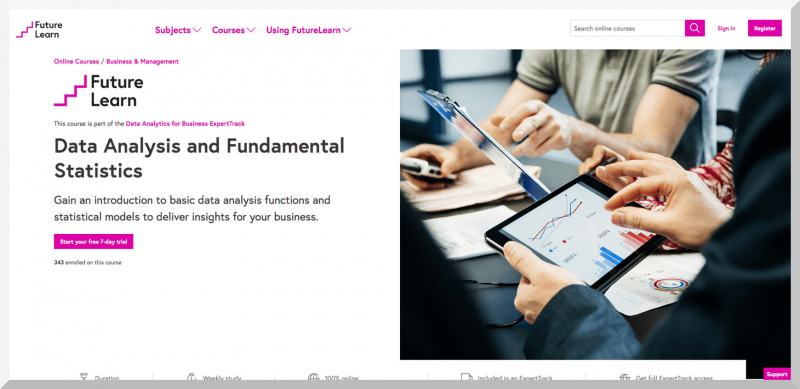
futurelearn.com -
On the edX platform, the Micromasters program is a specialization. There are four courses in this program, as well as a virtual proctored exam. Learners can expect to gain the abilities of data science and machine learning methodologies and tools for undertaking data analysis. The students will also learn how to apply and experiment with various data analysis approaches and machine learning algorithms, as well as the principles of probability and statistics. Foundation mathematics and mathematical reasoning, as well as a basic understanding of Python programming, are prerequisites for the course.
The takeaways from the course include:
- Mastering the foundations for data science, statistics, and machine learning
- Analyzing big data and derive insights for business decisions with probabilistic modeling
- Statistical inference and identifying methodologies, and deploying appropriate models
- Develop machine learning algorithms to work with unstructured data and learn popular unsupervised learning methods.
- Basics of deep neural networks, clustered methodologies, and supervised methods.
The course contents are:
- Probability: The science of uncertainty and data
- Fundamentals of statistics
- Machine learning with Python: From linear models to Deep learning
- Capstone
Electives:
- Data analysis in social science: Assessing your knowledge
- Data analysis: Statistical modeling and computation in applications
Instructor: Regina Barzilay, Eren Can Kizildag, Sara Fisher Ellison, Jan-Christian Hutter, Patrick Jaillet, Jagdish Ramakrishnan, Katie Szeto, Kuang Xu, Dimitri Bertsekas, Esther Duflo, Qing He, Tommi Jaakkola, Jimmy Li, Philippe Rigollet and John Tsitsiklis
Level: Intermediate/Advanced
Duration: 1 year 2 months
User Review: N.A.
No. of Reviews: N.A.
Price: $1528
Website: micromasters.mit.edu/ds/
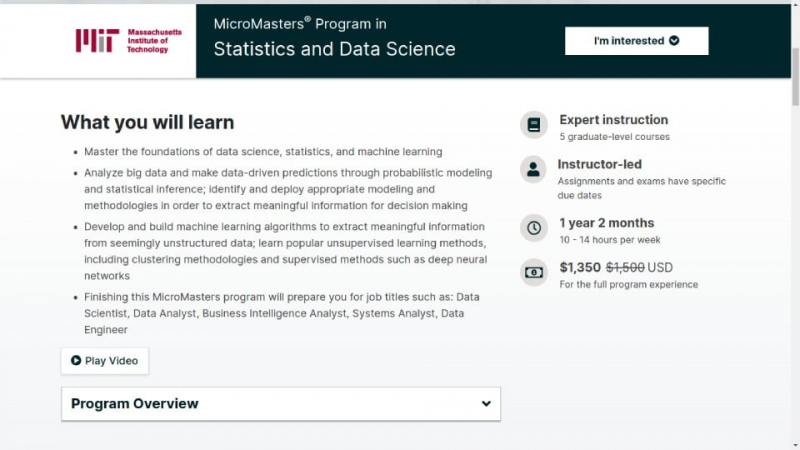
learnacourseonline.com 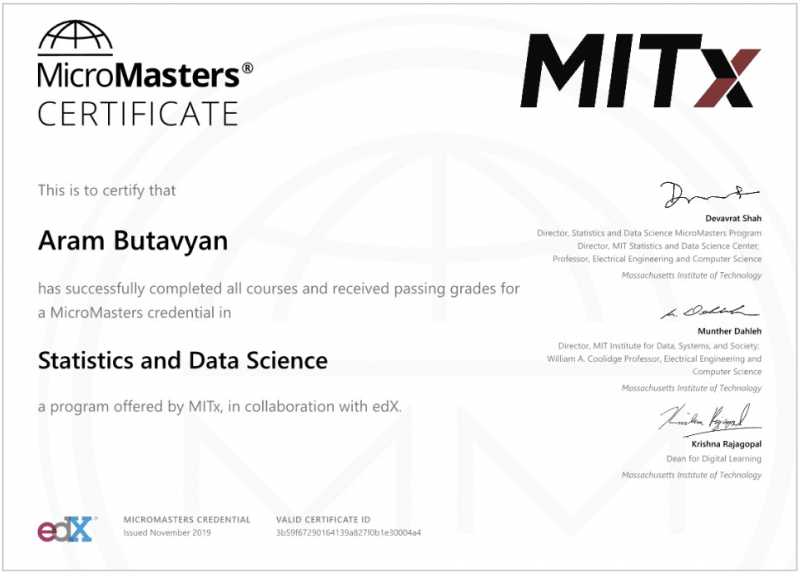
coursebapu.com















